This is a two-part post on the Dr. Carol Johnson District Leadership Fellowship focused on the School Segregation course offered this fall to the Fellows in the program and the Fellows who were invited to share their personal histories of segregation. This is an exciting new collaboration for what we hope will become a model for those committed to transforming systems and removing barriers to social justice in education.
The Dr. Carol Johnson District Leadership Fellowship, named in honor of visionary leader and former Boston Public Schools (BPS) Superintendent, Dr. Carol Johnson, is a 14-month program designed to empower BPS district and school leaders to prepare them for new and more complex challenges in the largest district in the multi-state region of New England. This unique collaboration between the district and Boston University, was created to meet the needs of the district and strengthen the University’s K-12 faculty leadership programs.
The inaugural cohort of the Dr. Johnson Fellowship consists of 14 Fellows: 7 of whom are school leaders from across neighborhoods of Boston and 7 of whom are central office leaders representing several departments. It is important to note that these are leaders with strong connections to Boston, many of whom have grown up in the city and are graduates of BPS. A few are current parents of students within the district and are deeply invested in improving educational outcomes.
The senior leadership team at BPS and the faculty at BU Wheelock felt that it was essential for leaders dedicated to equity and social justice to study the history of school segregation in the communities where they lead. We will share some of what faculty and fellows learned. Many have had the experience of attending racially segregated schools in their youth. We believe that the potential for broader impact in the future of Boston and in other urban districts is crucial, especially at a time when we are called to focus on and fortify our commitment to one of the most prominent challenges of social justice in our time: public education.

Each course in the Fellowship program, selected by BPS senior district leaders in collaboration with faculty members at BU, addresses the skills and knowledge required of senior leaders in the district. The courses are structured specifically for co-teaching, by BU faculty who bring deep content expertise, as well as experts and leaders identified by the district’s senior leadership team, adjunct faculty who bring deep context expertise.
The School Segregation course, designed by Dr. Raul Fernandez, senior lecturer at BU Wheelock, and former Chair of the Department of Elementary and Secondary Education’s Racial Imbalance Advisory Council, was co-taught by Dr. Fernandez and Tanisha Sullivan, former founding Chief Equity Officer for BPS, and current president of the Boston chapter of the National Association for the Advancement of Colored People (NAACP). This powerhouse led the Fellows through an examination of the history leading up to and including the landmark Supreme Court case, Brown v. Board of Education, to the continued impact of segregation that exists in many districts across the country today. This highly relevant local history continues to unfold today: The impact of the 1974 Garrity ruling, which ordered immediate school desegregation, and the recent SCOTUS decision on Boston Schools’ admission exam policy—decisions that have a lasting effect on students. It is because of this significance that BPS senior leaders identified School Segregation as an essential course offered in the first semester of the Fellowship.
During the course, the Fellows have deepened their understanding of desegregation and integration in Boston, to which they bring their own histories with these initiatives. In conversation with the Fellows, several talked about desegregation: It is about resource allocation and equitable access to those resources. One Fellow shared their experience teaching across BPS and said, “Some [students’] schools had more educators who are highly qualified; others had schools that were mostly staffed with substitutes. Some students had teachers who would remain with them for the entire year.... [In] the 4th grade class [I taught] — I was the first teacher they had had for an entire year, and that was in 4th grade!”
To meet this challenge which has spanned generations, one Fellow commented, “Having looked at all the cases and all the states [under review in the course], currently there hasn’t been much progress [in desegregation]. Do we need to use a new set of tools to fight this fight?” The answer is a resounding ‘yes’ and, the people wielding those tools for a better and more just future are the inaugural Dr. Johnson Fellows. Dr. Fernandez agrees, “Education leaders in BPS and across the Commonwealth would greatly benefit from [the Fellows’] expertise in addressing the complex problem of racial segregation, particularly as it relates to shaping improved experiences, supports, and outcomes for students of color.”
The second part of this post will explore the individual experiences of the Dr. Johnson Fellows—the perspectives that uniquely qualify them to be agents of change and champions of Boston Public Schools. Part II will be posted on Monday, January 20th, 2025.
Written by Irene Dennison, Associate Director of Boston University and Boston Public Schools Academic Partnerships





